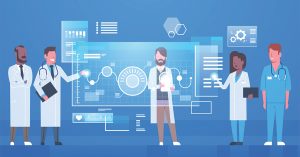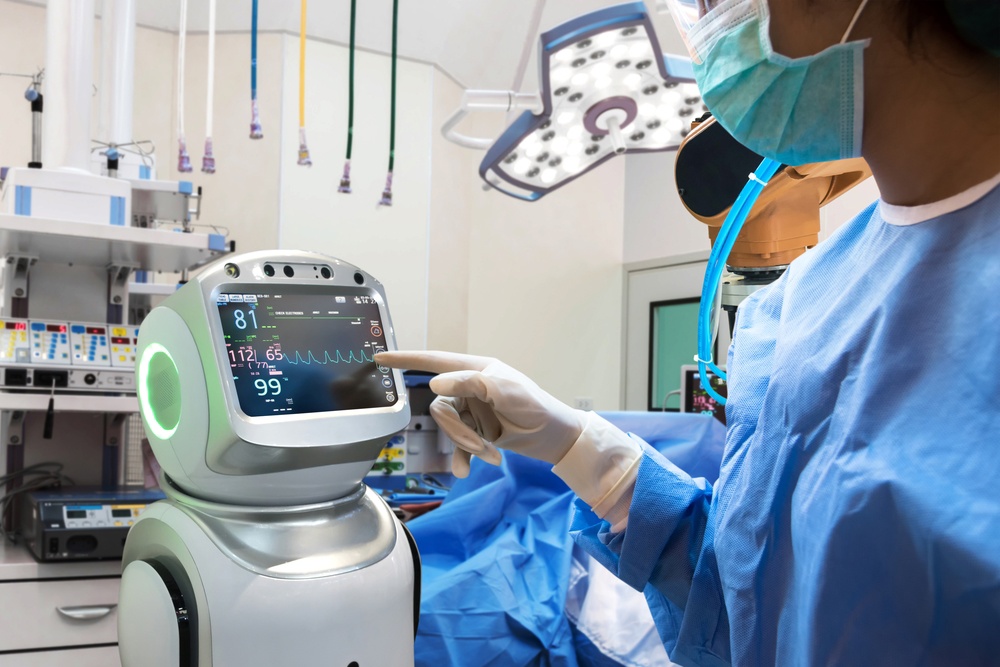The healthcare industry is undergoing a significant transformation, thanks to the advent of artificial intelligence (AI). This powerful technology is redefining the paradigms of medical diagnostics, patient care, and healthcare administration. By leveraging AI, the medical field can achieve unprecedented accuracy in disease diagnosis, offer personalized treatments, and improve the overall efficiency of healthcare services.
The Dawn of AI in Healthcare
The journey AI in healthcare began with trailblazing like IBM’s Watson, which demonstrated AI’s potential in processing and interpreting vast amounts of data rapidly. This milestone paved the way for major technology firms, including Apple, Microsoft, and Amazon, to explore and invest in medical AI applications. Today, AI’s footprint in healthcare spans from analyzing electronic health records (EHRs) for early disease detection to employing machine learning algorithms for developing tailored treatment plans.
Transformative AI Technologies in Medicine

Machine learning stands at the forefront of AI in healthcare, offering tools to dissect and understand vast datasets. This branch of AI enhances the accuracy of disease diagnosis and the efficacy of treatments by indentifying patterns within clinical data. Machine learning’s capability to predict patient outcomes and assist in precision medicine makes it a cornerstone of modern medical care.
Natural Language Processing (NLP)
NLP technology has significantly impacted healthcare by allowing computers to comprehend and analyze human language within clinical documentation. This enables more accurate patient diagnoses and personalized treatment plans by extracting and interpreting relevant information from unstructured healthcare data.
Rule-Based Expert Systems
While rule-based systems have a longer history in healthcare, they continue to provide valuable decision support in clinical settings. These systems utilize a series of if-then rules to assist in diagnosis and treatment, though they face challenges with scalability and adaptability as medical knowledge evolves.
The Impact of AI on Patient Care and Administration
AI’s introduction to healthcare goes beyond clinical applications; it revitalizes administrative tasks by automating routine processes like appointment scheduling and claims processing. This not only enhances the efficiency of healthcare operations but also allows care providers to focus more on delivering quality patient care. Moreover, AI’s ability to analyze a patient’s medical history comprehensively improves the precision of healthcare delivery, ensuring that patients receive the most effective treatments promptly.
Drug Interactions
Drug interactions refer to the phenomenon where the effects of one medication are altered by the presence of another medication, food, drink, or environmental chemical. Understanding and managing drug interactions is crucial for patient safety and treatment effectiveness. These interactions can either diminish the therapeutic effect, leading to treatment failure, or increase drug activity, potentially causing toxicity or adverse reactions. Healthcare professionals rely on comprehensive medication histories and specialized software to identify potential drug interactions and adjust treatment regimens accordingly. The primary goal is to ensure that all administered drugs coexist without compromising patient health.
Electronic Health Records (EHRs)
Electronic Health Records (EHRs) are digital versions of patients’ paper charts, providing real-time, patient-centered records that make information available instantly and securely to authorized users. EHRs are more than a direct analog to paper charts; they contain all of a patient’s medical history, diagnoses, medications, treatment plans, immunization dates, allergies, radiology images, and laboratory test results They facilitate broader access to data, enabling more coordinated, patient-focused care and allowing for substantial improvements in healthcare delivery and medical research. Furthermore, EHRs support the use of clinical tools, analytics, and reminders that enhance the decision-making processes and streamline operations within healthcare settings, ultimately aiming to improve the quality and efficiency of patient care.
Disease Diagnosis
Disease diagnosis involves identifying a disease or condition from its symptoms, patient history, and often a range of diagnostic tests. Accurate disease diagnosis is the cornerstone of effective treatment and management. It involves a systematic approach that starts with a thorough patient history and physical examination, followed by targeted testing to rule out or confirm potential conditions. In recent years, advancements in technology such as medical AI have significantly improved diagnostic accuracy and efficiency. Diagnostic tools and methodologies range from simple physical examinations to sophisticated imaging technologies and genetic testing, depending on the nature of the suspected condition. Prompt and precise disease diagnosis is critical to initiating the most appropriate treatment strategies, improving patient outcomes, and, in many cases, saving lives.
Addressing Challenges and Ethical Concerns
The integration of AI in healthcare is not without its challenges. Issues such as data privacy, security, patient safety, and the need for regulatory compliance are at the forefront of discussions among healthcare providers and technologists. Furthermore, ensuring that AI systems are transparent and their decision-making processes understandable is crucial for gaining the trust and acceptance of medical professionals.
AI’s Ascendency in Healthcare: A Historical Perspective

The surge in the popularity of AI within the medical sector marks a pivotal change in healthcare delivery. What began as an exploration in the early 21st century has evolved into a significant movement towards more effective, efficient, and personalized patient care. The exponential growth of the AI healthcare market underscores the vital role this technology plays in the future of medicine.
The Future Landscape of Medical AI
Looking ahead, the potential of AI in healthcare is limitless. From accelerating drug discovery through deep learning algorithms to enhancing diagnostic precision and patient engagement, AI is poised to drive a new era of medical innovation. However, the ultimate success of AI in healthcare hinges on seamless integration into clinical workflows and achieving a balance between technological advancements and the human touch in patient care.
Conclusion
Artificial intelligence in healthcare represents a bridge to the future—a future where medical care is more accurate, efficient, and personalized. As medical AI continues to evolve, it promises to unlock new dimensions of healthcare capabilities, making effective treatment accessible to all. Yet, the journey ahead requires careful navigation, balancing technological integration with ethical considerations and human values. With ongoing advancements and a collaborative approach, AI will undoubtedly continue to revolutionize healthcare, offering brighter prospects for patients and providers alike.




